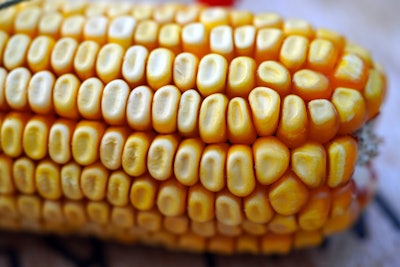
On Monday, the U.S. threatened legal action against Mexico'splan to ban imports of genetically modified cornin 2024, saying it would causehuge economic losses并显著impact bilateral trade, reportsReuters.
The countries are already in dispute resolution talks over Mexican energy policies, which the U.S. argues violates the U.S.-Mexico-Canada (USMCA) trade pact.
The 2020 decree by Mexican President Andres Manuel López Obrador aims to phase out GM corn and the herbicide glyphosate by 2024.
"America’s farmers are deeply concerned with President Obrador’s decree to phase out the importation of biotech corn and agriculture products," saidAmerican Farm Bureau FederationPresident Zippy Duvall.
"This import ban will only hurt the people of Mexico, and America’s farmers, who are dedicated to growing safe and affordable food for families on both sides of the border."
'Significant impact' on bilateral trade with Mexico
After a recent meeting with López Obrador, Agriculture Secretary Tom Vilsack said ina statementthat the phase-out decree has the potential to substantially disrupt trade, harm farmers on both sides of the border and significantly increase costs for Mexican consumers.
“We must find a way forward soon and I emphasized in no uncertain terms that -- absent acceptable resolution of the issue -- the U.S. Government would be forced to consider all options, including taking formal steps to enforce our legal rights under the USMCA," said Vilsack.
Vilsack noted the decree would have significant impact on the U.S.-Mexico trade relationship, which hit a record value of more than $63 billion in two-way trade in 2021 and is expected to be even higher in 2022.
“We made it abundantly clear that Mexico’s import ban would cause both massive economic losses for Mexico’s agricultural industries and citizens, as well as place an unjustified burden on U.S. farmers," said Vilsack.
Some progress made with meeting
While time is running short to resolve the GMO issue, Vilsack noted there was some progress made during the meeting with López Obrador.
For example, López Obrador reaffirmed the importance of yellow corn imports for Mexico’s food security. He also discussed a potential process in which the U.S. can exchange information and engage in dialogue assuring the safety of biotechnology products.
"We expect to have a proposal from the President’s team soon and we will evaluate closely," said Vilsack. "While we do not have a solution in hand, we will continue to engage with Mexico on this important issue.”
Impact of ban on North American corn exports
Mexico imports about 17 million metric tons (669,256,000 bushels) of U.S. corn a year and is on track to import even more this year.
According to areport from CropLife International:
- Farmers in the U.S. are expected to experience a net economic loss of $3.1 billion and could shrink GDP by $7.95 billion in the first 10 years after implementation
- Canadian farmers are expected to experience a net economic loss of $171 million and could shrink GDP by $73 million in the first 10 years after implementation
- U.S. employment could fall by 8,700 jobs annually, 1,400 of which are directly tied to grain farming
Mexico cannot provide enough domestic corn nor can they source a sufficient amount of non-GM corn to support its domestic food and feed needs, says the report. In 2021, Mexico’s corn imports accounted for 4.4% of all the corn produced in the U.S. (24% of U.S. corn exports).
Changes resulting from a blanket ban on GM corn would significantly disrupt global corn exports and the import of corn to Mexico, since over 90% of corn produced in the U.S. is GMO.
“The United States-Mexico-Canada-Agreement is important for America’s farm economy, making Secretary Vilsack’s meeting with President Obrador of Mexico critically important," said Duvall. “Proven advances in technology allow farmers to meet demands while achieving important sustainability goals. We appreciate Secretary Vilsack for standing firm in support of American agriculture and we encourage him to continue pressing for fair trade between the U.S. and Mexico.”





















